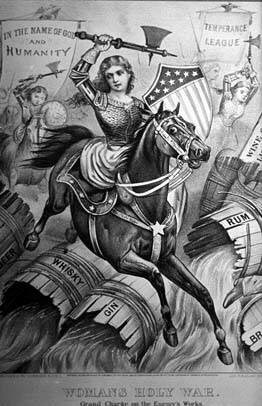Temperance movement
|
|
The Temperance Movement (see definition of temperance) was a movement in support of total abstinence from alcohol during the 19th and early 20th centuries. It was generally confined to English-speaking countries, and was particularly strong in the United States and Wales.
In the United States, the term Temperance Movement is sometimes applied specifically to the period starting about 1845 and ending when the Prohibition era began in 1918 with the passage of the Volstead Act.
The movement blamed many of society's ills--including joblessness and domestic violence--on the drinking of alcoholic beverages, and tried to persuade people to abstain from these by becoming teetotalers.
The "temperance movement" existed alongside various women's rights movements, and indeed the Progressive movement, and often the same activists were active in all of the above. Many notable voices of the time, ranging from Lucy Webb Hayes to Susan B. Anthony, were active in the movement. In Canada, Nellie McClung was a longstanding advocate of temperance.
The movement began in earnest in the state of Maine, with the passage of the so-called "Maine law." As with most social movements, there was a gamut of activists running from violent (Carrie Nation) to mild (Neal S. Dow). Actually, the largest and most influential temperance organization in the U.S. was the Woman's Christian Temperance Union.
Some parts of the movement wished to ban alcoholic beverages entirely. Political pressure from the movement eventually resulted in the establishment of Prohibition with the passage of 18th Amendment to the U.S. Constitution.
See also: Washington movement ; Knights of Father Matthew ; International Organisation of Good Templars
Compare: William Hogarth's "Gin Lane" 1751.de:Abstinenzbewegung

